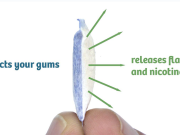The study published in Frontiers in Psychiatry, was conducted by following 24 chronic smokers and looking at their brain activity through an MRI machine. Each patient had to visit the research facilities on four occasions, but were only given real cigarettes two times of the four. When given the real cigarettes, they were once told the cigarette was real, and once that it was not, and the same process was repeated with the “fake” cigarettes.
The result? When smoking the real cigarettes, the study subjects only felt satisfied when they knew they were smoking real cigarettes. When told they were not getting nicotine, (even if they were), they did not experience any of the effects of nicotine. On the other hand non nicotine containing cigarettes did not have any effect on the study subjects, irrelevant of what they were told.
Our brain delivers messages through its neurons (nerve cells), by the use of special chemicals called neurotransmitters. Nicotine molecules are shaped very similar to those of an important neurotransmitter called Acetylcholine which plays a role in many body functions amongst which muscle movement, breathing, heart rate, learning, and memory. Hence why some of our senses are slightly heightened when nicotine is consumed.
Recently, scientists have made another discovery, finding that nicotine is also involved in raising the level of another neurotransmitter called Dopamine. Dopamine is a feel good hormone that produces feelings of reward and pleasure. However this latest study from Frontiers of Psychiatry has found that none of these effects of nicotine can be activated, unless the smoker knows and believes that he is receiving nicotine, once again highlighting the power of the mind.
How does this knowledge apply to the anti-smoking crusade?
There have been many debates about e-cigarettes as they have been proven to be the most effective smoking smoking cessation tool. One of the points brought up around their effectivity is the fact that they mimic the action of smoking. Is it possible that contrary to when using other NRT’s, through the action of vaping e-cigarette users are more aware of inhaling nicotine, hence why the effects are activated and provide more satisfaction than using a patch or a nicotine gum?
The Centers for Disease Control and Prevention, (CDC), estimates that 70% smokers want to quit smoking and that only 6% manage to, and the above study shows that a cessation method will only be effective if the subject believes it is. However not all hope is lost, on the contrary, things look rather promising as many studies are showing that there is an evident link between the increase in e-cigarette use and a decrease in smoking, with a recent EU study finding that e-cigarettes have helped 6 million people quit the deadly habit of smoking.
Gu X., Lohrenz T., Salas R., Baldwin PR., Soltani A., Kirk U., Cinciripini PM., Montague R., 2016. Belief about Nicotine Modulates Subjective Craving and Insula Activity in Deprived Smokers. Frontiers in Psychiatry, 7 DOI: 10.3389/fpsyt.2016.00126












